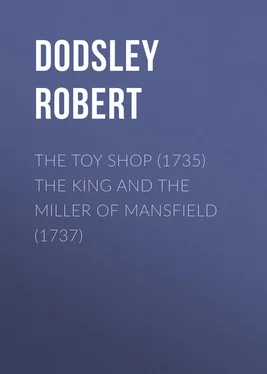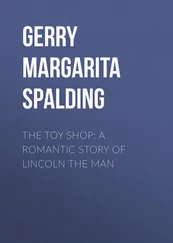Robert Dodsley - The Toy Shop (1735) The King and the Miller of Mansfield (1737)
Здесь есть возможность читать онлайн «Robert Dodsley - The Toy Shop (1735) The King and the Miller of Mansfield (1737)» — ознакомительный отрывок электронной книги совершенно бесплатно, а после прочтения отрывка купить полную версию. В некоторых случаях можно слушать аудио, скачать через торрент в формате fb2 и присутствует краткое содержание. Жанр: literature_18, foreign_antique, foreign_prose, foreign_dramaturgy, на английском языке. Описание произведения, (предисловие) а так же отзывы посетителей доступны на портале библиотеки ЛибКат.
- Название:The Toy Shop (1735) The King and the Miller of Mansfield (1737)
- Автор:
- Жанр:
- Год:неизвестен
- ISBN:нет данных
- Рейтинг книги:5 / 5. Голосов: 1
-
Избранное:Добавить в избранное
- Отзывы:
-
Ваша оценка:
- 100
- 1
- 2
- 3
- 4
- 5
The Toy Shop (1735) The King and the Miller of Mansfield (1737): краткое содержание, описание и аннотация
Предлагаем к чтению аннотацию, описание, краткое содержание или предисловие (зависит от того, что написал сам автор книги «The Toy Shop (1735) The King and the Miller of Mansfield (1737)»). Если вы не нашли необходимую информацию о книге — напишите в комментариях, мы постараемся отыскать её.
The Toy Shop (1735) The King and the Miller of Mansfield (1737) — читать онлайн ознакомительный отрывок
Ниже представлен текст книги, разбитый по страницам. Система сохранения места последней прочитанной страницы, позволяет с удобством читать онлайн бесплатно книгу «The Toy Shop (1735) The King and the Miller of Mansfield (1737)», без необходимости каждый раз заново искать на чём Вы остановились. Поставьте закладку, и сможете в любой момент перейти на страницу, на которой закончили чтение.
Интервал:
Закладка:
Robert Dodsley
The Toy Shop (1735) The King and the Miller of Mansfield (1737)
INTRODUCTION
The career of Robert Dodsley (1703-1764), or "Doddy" as Samuel Johnson affectionately called him, resembles nothing so much as the rise of Francis Goodchild in Hogarth's Industry and Idleness (1747) series. Like Goodchild, Dodsley began as a humble apprentice and, through energy, ingenuity, and laudable ambition, grew prosperous and gained the esteem of all London. Today Dodsley is remembered as the most important publisher of his period, a man who numbered among his authors Pope, Young, Akenside, Gray, Johnson, Burke, Shenstone, and Sterne. His long-labored Collection of Poems (1748) rescued many of his contemporaries' works from pamphlet obscurity and even now provides both the best and the most representative introduction to mid-eighteenth-century English poetry. His twelve-volume A Select Collection of Old Plays (1744) made the lesser Elizabethan dramatists, long out of print, available again.
It is one of the minor ironies of literary history that the man who did so much to insure the survival of the poems and plays of others has had his own almost entirely forgotten. For Dodsley was not always a bookseller. When he escaped his country apprenticeship and fled to London to work as a footman, Dodsley had his heart set on literary distinction; and it was first as poet and later as playwright that he came to the attention of the Town. Although a few of his poems are as ingratiating as Dodsley himself is reported to have been, most are now aesthetically irretrievable. His dramas, in contrast, remain interesting. Two of the best — The Toy-Shop (1735) and The King and the Miller of Mansfield (1737) – were much more popular than his earlier poems and for a time made him seem the equal of fellow dramatist Henry Fielding. So great was the vogue of these two works that Dodsley has been described as the principal developer of the sentimental or moralizing afterpiece. 1 1 Leo Hughes, A Century of English Farce (Princeton: Princeton University Press, 1956), 126.
Both works are short afterpieces intended to complement or contrast with the full-length play on the day's bill and both moralize conspicuously; the two plays could, however, hardly be more different in tone and technique.
The Toy-Shop grew out of Dodsley's admiration of and consequent desire to emulate the witty raillery of Augustan satire. When he sent Pope his newly minted collected poems, A Muse in Livery (1732), Dodsley also included an orphan muse in the packet. In February of 1733 Pope politely responded that he liked the play and would encourage John Rich to produce it, but that he doubted whether it had sufficient action to engage an audience. Dodsley apparently did all he could to strengthen his acquaintance with Pope, including publishing a laudatory Epistle to Mr. Pope, Occasion'd by His Essay on Man in 1734; and the following February when Rich finally produced The Toy-Shop at Covent Garden, some thought that Pope was the author and Dodsley's alleged authorship a diversion. Understandably, Dodsley was delighted to have his play even momentarily mistaken for the work of Alexander Pope.
The Toy-Shop was enormously popular. "This little Performance, without any Theatrical Merit whatsoever," the Prompter wrote on 18 February, "received the loudest Applauses that I have heard this long while, only on Account of its General and well-Adapted Satire on the Follies of Mankind." 2 2 The London Stage 1660-1800: Part 3: 1729-1747 , ed. Arthur H. Scouten (Carbondale: Southern Illinois University Press, 1961), 457.
Dodsley's afterpiece was performed thirty-four times during the 1735 season. In print it was even more in demand. For his benefit performance on 6 February, Dodsley advertised that "Books of the Toy-Shop will be sold in the House." 3 3 Ibid., 458.
There were at least six legitimate editions of the piece within the year. It was pirated, translated into French, and subsequently anthologized in almost every collection of English farces. 4 4 Ralph Straus, Robert Dodsley: Poet, Publisher and Playwright (London: John Lane, 1910), 35.
Every critic has concurred with Pope in finding the play plotless. The short first scene establishes the premise: that the Master of the shop is "a general Satyrist, yet not rude nor ill-natur'd," who moralizes "upon every Trifle he sells, and will strike a Lesson of Instruction out of a Snuff-box, a Thimble, or a Cockle-shell" (p. 10). Working within a tradition that includes Lucian's sale of philosophers and, just after The Toy-Shop , Fielding's auction in The Historical Register, For the Year 1736 (1737), Dodsley acknowledged that his premise was adopted directly from Thomas Randolph's Conceited Pedlar (1630). His metaphor of the world as "a great Toy-shop, and all it's [ sic ] Inhabitants run mad for Rattles" (p. 45) recalls the brilliant penultimate verse paragraph of "Epistle II" of Pope's Essay on Man , wherein mankind is shown as eternally addicted to "toys" of one kind or another:
Pleas'd with this bauble still, as that before;
Till tir'd he sleeps, and Life's poor play is o'er!
With so many unmistakable resemblances to Pope in Dodsley's play, it is not surprising that some spectators thought they detected the hand of the author of The Rape of the Lock .
Following a hint from Pope that the strength of his afterpiece lay in its mixture of morality and satire, Dodsley titled his work "A Dramatick Satire" and begged indulgence in the epilogue for his "dull grave Sermon" (p. 5). In fact, the merit of the work is the wit with which the Master of the shop extemporizes over each sale. "Why, Sir," one character says, "methinks you are a new Kind of a Satirical Parson, your Shop is your Scripture, and every piece of Goods a different Text, from which you expose the Vices and Follies of Mankind in a very fine allegorical Sermon" (p. 17). Jean Kern lists the satiric allegory as one of the five major forms of dramatic satire during this period, but judges The Toy-Shop a failure in that genre because, instead of a sustained allegory, Dodsley provides "a jumble of annotated sales of abstractions with no controlling metaphor. The toys for sale are interesting only for the value which the characters assign to them; the result is a miscellany of characters assigning a miscellany of values." 5 5 Jean B. Kern, Dramatic Satire in the Age of Walpole , 1720-1750 (Ames: Iowa State University Press, 1976), 149.
Thus, the problematic nature of a genre that attempts to dramatize satire with no more than perfunctory recourse to plot or characterization and Dodsley's failure to sustain consistently his comparison between those objects that mankind values and mere toys both contribute to the play's lack of "Theatrical Merit." It may also suggest why The Toy-Shop was even more popular in print than on the stage. Nevertheless, even with all its dramatic inadequacies acknowledged, the play retains a charming Tatler-esque ingenuity that still amuses.
Income from The Toy-Shop and the gift of a hundred pounds from Pope allowed Dodsley to open, under the sign of Tully's Head, the bookshop that was to become so important in the history of English literature. Dodsley the bookseller did not cease writing; when The King and the Miller of Mansfield opened at Drury Lane on 29 January 1737, with young Colley Cibber in the role of Henry II, it was evident that Dodsley's stagecraft had improved. The play was a triumph, with thirty-seven performances in 1737 – the most popular play of the year and one of the most popular plays of the century.
Читать дальшеИнтервал:
Закладка:
Похожие книги на «The Toy Shop (1735) The King and the Miller of Mansfield (1737)»
Представляем Вашему вниманию похожие книги на «The Toy Shop (1735) The King and the Miller of Mansfield (1737)» списком для выбора. Мы отобрали схожую по названию и смыслу литературу в надежде предоставить читателям больше вариантов отыскать новые, интересные, ещё непрочитанные произведения.
Обсуждение, отзывы о книге «The Toy Shop (1735) The King and the Miller of Mansfield (1737)» и просто собственные мнения читателей. Оставьте ваши комментарии, напишите, что Вы думаете о произведении, его смысле или главных героях. Укажите что конкретно понравилось, а что нет, и почему Вы так считаете.










